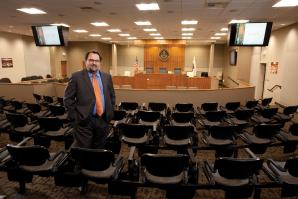Ryan M. Norman is the son of a pharmacist, raised in Vacaville with dreams of being an FBI special agent. When that path proved unlikely, he became an attorney instead. But by the time he enrolled in the UC Davis School of Law in 2009, the legal market was drying up. As a law student, he secured a few interviews and interned his first summer at the U.S. Attorney’s Office, expecting that to lead to a job offer come graduation. When nothing panned out, it seemed another unachievable dream.
“It’s hard to describe,” he says. “It was just kind of a shock. For a lot of my class, I think we went in with a lot of expectations that were unsupported in the new market.”
Just two years prior, the legal market was booming. But in 2008, when the economy came crashing down, the legal industry followed suit. Across the country, firms cut back on hiring programs. Fewer recruiters visited schools. As a result, a large portion of law school students who graduated between 2009 and 2013 have failed to land jobs inside firms or in their legal field of interest. Only the best of the best were hired at big firms, while the rest — with debts eclipsing $100,000 — were fielding nickel-and-dime offers, doing contract work or applying to the nearest coffee shop.
In the Capital Region, the industry felt the burn big time, evidenced by layoffs, reduced summer classes and drops in school enrollment. Of the region’s two big law schools, the University of the Pacific’s McGeorge School of Law fared worse than UC Davis’s. Back in 2007, 84 percent of law school graduates at McGeorge landed full-time legal jobs. By 2012, that number had plummeted to 48 percent.
But the future looks a lot less bleak for 2014 law school grads, who are charging into the industry with a sharp focus and sharper tools. Across the country, the job offer rate last year for students who participated in law firm summer programs was 92 percent, up from 69 percent in 2009, according to a recent report from the nonprofit National Association for Law Placement. That is one point short of the record 93 percent offer rate set in 2007.
Is this a return to the pre-downturn boom years? Not exactly. The average summer class size remains smaller, which means fewer overall job offers compared to seven years ago. Regardless, national figures point to a steady if meager upswing. Throughout the region, hiring managers are observing a similarly slight upward trend. Still, the legal industry remains in recovery mode, and new support programs are being established to arm tomorrow’s lawyers for modern realities. In the past twelve months, the region’s law schools have added new courses to better prepare students for the legal world, but the recession, in many ways, has proved to be the best crash course yet.
Natural Selection
Post-recession graduates knew the risks even before they applied to law school. Facing the financial crisis, a turbulent job market and the certainty of epic debt, they bet their chips anyway. Many prospective lawyers changed career paths, but the ones who powered through became high-caliber candidates with unwavering drive, a critical trait in a demanding, service-first profession, says Tom Welsh, managing partner at the Sacramento office of Orrick Herrington & Sutcliffe.
“We’re seeing a higher-quality graduate coming out of law school right now,” he says. “They come out hungry for work, more aware of the demands that are presented in the practice. I think the recession had a filtering effect.”
The downturn also provided Orrick Herrington & Sutcliffe with an opportunity to rethink the way it enlists new hires. Summer associate programs in which big firms hire second-year law students for the summer have long been the industry’s main recruitment strategy. If a student performs well, the firm will offer a full-time position after graduation. But this means the firm must wait another two years before the candidate can start work, which can prove counterproductive when it comes to meeting immediate client needs, Welsh says. As a result, the firm has abandoned its summer program to focus on hiring about three graduated lawyers a year.
At Best Best & Krieger, the summer associate program remains in full effect, holding steady with five associates coming on this summer.
“During the economic downturn, there was a lot of concern about hiring and the need to either start people later or defer people,” says Danielle Sakai, BB&K’s recruiting chair and hiring partner. “That certainly has changed. We’re bringing people in sooner after the bar [exam] than we had.”
She has not seen many applications from graduates two to three years out of school, which means they already have jobs or left the field. The standouts among the new crop, she says, spent their law school years doing internships, clerkships with federal judges, gaining experience with political officials and getting multiple degrees.
“They’re not taking anything for granted,” she says. “We’re seeing that the entry-level attorneys we have are eager and want to hit the ground running.”
Number Crunch
But before they run, prospective lawyers must learn to walk. Law schools are the pivotal training ground. But as the economy forced many law firms to hire fewer lawyers, schools felt the sting from drops in enrollment and fewer graduates finding full-time work, which affects schools’ national rankings.
But both UC Davis and McGeorge seem to be trending with the market’s overall subtle uptick. In 2013, 73 percent of UC Davis graduates landed full-time legal jobs within nine months of graduation, up from 60.5 percent in 2011. At McGeorge, 50 percent of the 2013 graduates secured full-time, long-term employment, according to the American Bar Association.
To get the new crop of graduates more “practice-ready,” McGeorge is adding new courses this fall that focus on legislation, regulation and analytical skills. “It has always been on the horizon, but we accelerated the rolling out of the curriculum in response to the needs of the changing legal market,” says Molly Stafford, director of career development at McGeorge.
Meanwhile, the Sacramento County Bar Association created the Mentorship Task Force program last year to help connect soon-to-be graduates with young attorneys. The task force has hosted two “speed-networking” events, and as of March, the database of participants consists of about 60 mentors and 150 mentees looking for real-world perspective and guidance.
Nooria Kakar, who emigrated from Afghanistan at age 9, was one of them. She graduated from the online Concord Law School in 2012. After passing the bar and struggling to find a job in the region’s floundering legal market, Kakar realized she needed mentors and got connected with the association.
“I’ve met with so many top-notch people,” she says. “I want to align myself with experts in each area and each field to build a strong foundation first. One thing I will say is that, different from what I’ve heard, everyone I’ve talked to and asked for help has been extremely helpful.”
Jason Jasmine, chair of the task force, hopes to foster these relationships through more initiatives such as skills workshops, brown-bag lunches and potential job shadowing opportunities.
But what about those other grads from two or three years ago?
Jasmine says some have been fortunate enough to find jobs with small firms, in government or nonprofits, while others have decided to go it alone. “They’re saying, ‘I had no idea what I was doing, but I was forced to learn because you’re not going to be able to make a living and put food on the table if you don’t.’”
Making Practice Perfect
These days, Ryan Norman works out of an office he describes as “somewhat spartan, but functional.” There is little furniture, no artwork. But under the high ceilings of a historic building in Old Sacramento, Norman is way too busy with his 15 clients to be concerned with interior design.
Last year, after months spent job hunting and hoping, Norman opened his own practice. He provides legal support for small businesses, mostly in the tech sector. Services include nondisclosure agreements, employment contracts, corporate formation documents, some basic financing agreements, promissory notes.
“I’m optimistic about all of this going forward,” says Norman, who sublets the office from a software client. “It’s been a pretty great, if at times terrifying, experience.”
In the future, Norman says, he would love to take on a partner and expand. In fact, he’s already had conversations about this idea with a good friend he wants to bring on. Still, that plan has its obstacles: His friend, a fellow 2012 UC Davis law grad, has been busy this past year helping out with big cases at a Bay Area firm.
Recommended For You

Law School Blues
Heavy debt plus no jobs plague grads and deter applicants
Like so many recent law school graduates, Seth Benkle searched vainly for a job after graduating from the University of the Pacific McGeorge School of Law in Sacramento in 2010, increasingly stressed about his $160,000 in student loans, interest accruing.

Juris Challenge
How to keep expensive, competitive law degrees attractive to dwindling applicants
Even a half-hearted glance at the headlines would suggest that these are hardly the glory days for the nation’s law schools.



